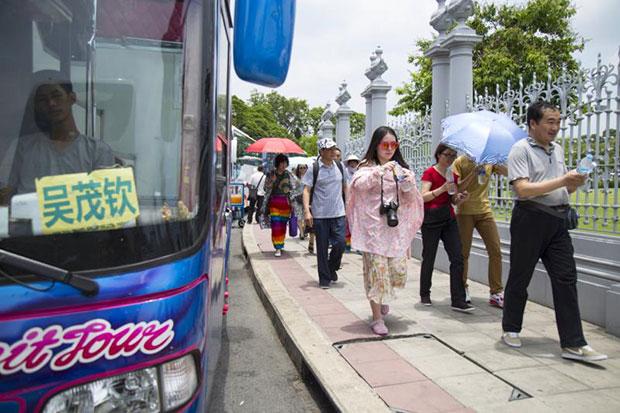Hoteliers predict Chinese tourist rush to continue in Thailand
HOTELIERS predict that tourist arrivals from China will continue to increase by up to 25 per cent a year over the next three years with a huge number of young Chinese travellers descending on the Kingdom.
According to the Chinese International Travel Monitor 2015 report, 84.9 per cent of hoteliers revealed that they had seen an increase in Chinese travellers, with 30 per cent experiencing an increase of between 26 and 50 per cent.
Hoteliers forecast that trend would continue with an increase of between 11-25 per cent a year until 2018. On top of the increasing numbers, hoteliers say Chinese travellers are getting younger.
The report found that 81.7 per cent of hoteliers said they had noticed more independent young Chinese travellers, or those aged between 18 and 35 (millennials).
China has been Thailand’s clear No 1 source market for a number of years.
Hotels.com found Chinese booking Thai destinations online increased by 32 per cent in 2104.
Abhiram Chowdhry, vice president and managing director Asia Pacific for Hotels.com, said the top 10 Thai destinations for Chinese travellers were Phuket, Bangkok, Chiang Mai, Koh Samui, Krabi, Pattaya, Hua Hin, Koh Phi Phi, |Koh Lanta and Koh Pha Ngan.
“Globally, Chinese travellers have grown financial muscle. An average traveller spends around Bt17,796 per day, including accommodation. The top 10 per cent of Chinese international travellers spend Bt73,771 per day including accommodation and spend an average of Bt14,556 per night on hotels alone,” said Chowdhry.
Big spenders
He said “super luxury” Chinese travellers, or the top five per cent of spenders, were sending Bt111,704 on average per day on mostly shopping, dining and sightseeing.
Furthermore, 47 per cent of the top 10 per cent of spenders intend to spend more on dining and food and half aim to spend more on entertainment.
According to the Chinese International Travel Monitor report, one-third of the top spenders usually stay in Thailand between six and nine days, and 33 per cent like to travel to at least two countries per trip.
Chowdhry said hoteliers across the globe had reported that Chinese travellers sought properties with free Wi-Fi and Mandarin-speaking staff.
For Thai hoteliers, one-third said Chinese guests mostly requested free Wi-Fi, Mandarin-speaking staff and translated tourism guides.
Hotels.com last week released its travel trends, which is highlighted by the fact that millennial and affluent travellers had fuelled 20 per cent growth in Chinese outbound travellers in 2014 – with the figure rising to 107 million.
Australia, Japan and France are the top three countries that Chinese travellers say they would like to visit in the next 12 months.
The pyramids, Mount Fuji and the Eiffel Tower are the top three global landmarks Chinese travellers would most like to visit in their lifetimes. Eight per cent of Chinese travellers this year used an online e-device including mobiles, desktops and laptops to plan and book travel, compared with only 53 per cent last year. Chinese tourists said the country with the warmest welcome was South Korea, followed by Thailand and Japan.





